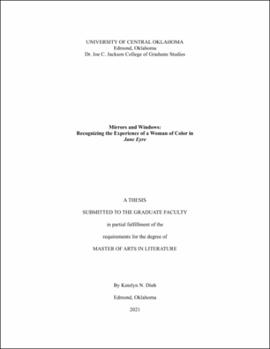| dc.contributor.advisor | Quoss-Moore, Rebecca M. | |
| dc.contributor.author | Dinh, Katelyn N. | |
| dc.date.accessioned | 2021-12-07T21:34:39Z | |
| dc.date.available | 2021-12-07T21:34:39Z | |
| dc.date.issued | 2021 | |
| dc.identifier.other | (AlmaMMSId)9982818493502196 | |
| dc.identifier.uri | https://hdl.handle.net/11244/331410 | |
| dc.description.abstract | This thesis aims to present the character of Bertha in Charlotte Brontë's Jane Eyre as a representation of feminism and Jane's transformation into an independent player in her relationship with Rochester by examining the similarities in struggle, circumstance, and oppression between the two women. A focus on feminist theory and critical race theory will inform this thesis. By viewing Bertha as a mirror and a window for Jane, both for Jane to realize her potential independence and to witness the oppression Bertha faces as a woman of color in Victorian England, it becomes clearer that Bertha should be read and recognized as an individual rather than vaguely characterized as a madwoman and a simple plot device for Jane's development. Most of the current scholarship on Bertha centers around speculation about her mental health, appealing to the common characterization of her as a madwoman. There is much less research on Bertha's racial background and how it affects the ways the other characters and society treat her. To understand the oppression she endures and to highlight her experience as a woman of color in Victorian England, I refer to the works of Toni Morrison. This examination of Bertha becomes inevitably linked to feminist theory as well, considering the patriarchal oppression both she and Jane experience. Though they experience oppression in different ways and to vastly different degrees, they share similarities so that Jane is able to see herself in Bertha, eventually leading her to feel confident enough to claim her autonomy. Despite the lack of characterization and time Brontë spends on Bertha, especially compared to Jane, this thesis argues that considering Bertha as a main character is critical to recognizing her value not only to the growth of Jane's character but also as an individual. Critical race theory, in combination with feminist theory, reads Bertha as a woman experiencing the worst of patriarchal and racial oppression, giving the title character a figure to model her independence after, no matter how subtle. Bertha's unapologetically wild and uncontrollable nature allows Jane space to develop her own identity and autonomy at her own pace, thus creating a path for Jane to finally maintain a degree of independence in her relationship with Rochester. This thesis ultimately advocates for the inclusion of critical race theory when analyzing the character of Bertha in order to adequately understand the prejudice and trauma she is subject to and the significance of her resulting influence on Jane. | |
| dc.rights | All rights reserved by the author, who has granted UCO Chambers Library the non-exclusive right to share this material in its online repositories. Contact UCO Chambers Library's Digital Initiatives Working Group at diwg@uco.edu for the permission policy on the use, reproduction or distribution of this material. | |
| dc.subject.lcsh | English literature | |
| dc.subject.lcsh | 19th century | |
| dc.subject.lcsh | Women | |
| dc.subject.lcsh | History and criticism | |
| dc.subject.lcsh | Feminist theory | |
| dc.subject.lcsh | Critical race theory | |
| dc.title | Mirrors and windows : recognizing the experience of a woman of color in Jane Eyre | |
| dc.type | Academic theses | |
| dc.contributor.committeeMember | Huber, Kate | |
| dc.contributor.committeeMember | Macey, J. David | |
| dc.thesis.degree | M.A., English Literature | |
| dc.subject.keywords | Bertha Mason | |
| dc.subject.keywords | Charlotte Brontë | |
| dc.subject.keywords | Feminism | |
| dc.subject.keywords | Jane Eyre | |
| dc.subject.keywords | Rochester | |
| dc.subject.keywords | Victorian | |
| dc.identifier.oclc | (OCoLC)1297841341 | |
| thesis.degree.grantor | Jackson College of Graduate Studies | |
